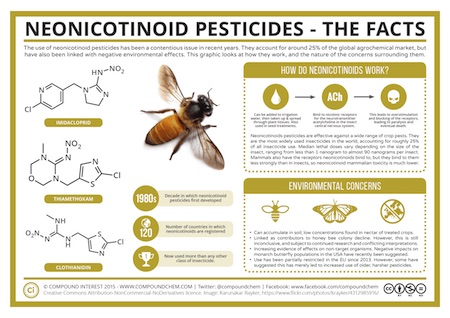SACRAMENTO, Calif.— California’s Department of Pesticide Regulation has announced it will no longer consider any applications by pesticide companies that would expand use of bee-killing neonicotinoid pesticides in the state.

The announcement comes just two weeks after the U.S. Environmental Protection Agency began consideringdramatically expanding use of the highly toxic neonicotinoid thiamethoxam on more than 165 million acres of farmland in the United States.
“California’s decision to halt further increases in harmful neonicotinoid pesticides is an important step toward reversing dangerous bee declines,” said Lori Ann Burd, director of the Center for Biological Diversity’s environmental health program. “As the Trump EPA works to weaken protections for pollinators, it’s reassuring that California continues to follow a course of reason and science.”
California’s freeze on new neonicotinoid uses and products covers all new and pending applications and will be lifted once the agency finishes an ongoing evaluation of the pesticides. California’s evaluation, which is being done in conjunction with the U.S. EPA, has identified harms to pollinators, aquatic insects and birds from the use of neonicotinoids.
The state’s efforts to prevent expansion of harmful neonicotinoid pesticides stands in sharp contrast to the EPA’s decision last month to consider allowing the spraying of the highly toxic pesticide thiamethoxam on tens of millions of acres of wheat, barley, corn, sorghum, alfalfa, rice and potatoes.
On the same day it began considering approving broader use of thiamethoxam, the EPA released multiple scientific assessments that found commonly used neonicotinoid pesticides can kill and harm birds of all sizes.
The EPA analysis found that if neonic-treated seeds make up just 1 percent to 6 percent of a bird’s diet, serious harms could result.
Early last year the EPA changed from mandatory to voluntary a common-sense rule that would have placed limited restrictions on neonics when commercial honeybees were present in fields.
Neonicotinoids are a class of pesticides known to have both acute and chronic effects on honeybees, birds, butterflies and other pollinator species, and they are a major factor in overall pollinator declines. These systemic insecticides cause entire plants, including pollen and fruit, to become toxic to pollinators; they are also slow to break down and therefore build up in the environment.
A large and growing body of independent science links neonicotinoids to catastrophic bee declines. Twenty-nine independent scientists who conducted a global review of more than 1,000 independent studies on neonicotinoids found overwhelming evidence linking the pesticides to declines in populations of bees, birds, earthworms, butterflies and other wildlife.
The Center for Biological Diversity is a national, nonprofit conservation organization with more than 1.6 million members and online activists dedicated to the protection of endangered species and wild places.
